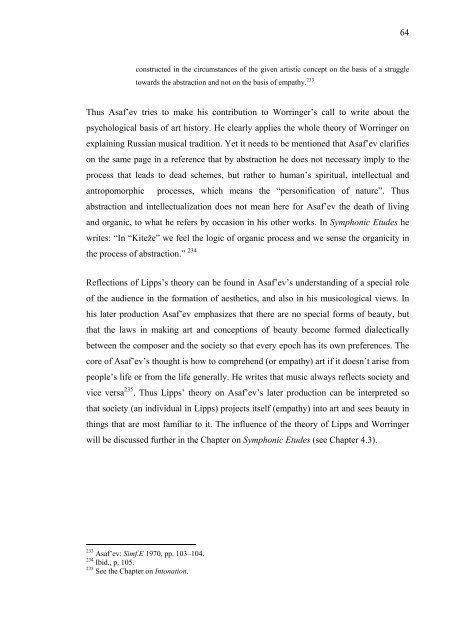Boris Asaf'ev and the Soviet Musicology - E-thesis
Boris Asaf'ev and the Soviet Musicology - E-thesis
Boris Asaf'ev and the Soviet Musicology - E-thesis
Create successful ePaper yourself
Turn your PDF publications into a flip-book with our unique Google optimized e-Paper software.
constructed in <strong>the</strong> circumstances of <strong>the</strong> given artistic concept on <strong>the</strong> basis of a struggle<br />
towards <strong>the</strong> abstraction <strong>and</strong> not on <strong>the</strong> basis of empathy. 233<br />
Thus Asaf’ev tries to make his contribution to Worringer’s call to write about <strong>the</strong><br />
psychological basis of art history. He clearly applies <strong>the</strong> whole <strong>the</strong>ory of Worringer on<br />
explaining Russian musical tradition. Yet it needs to be mentioned that Asaf’ev clarifies<br />
on <strong>the</strong> same page in a reference that by abstraction he does not necessary imply to <strong>the</strong><br />
process that leads to dead schemes, but ra<strong>the</strong>r to human’s spiritual, intellectual <strong>and</strong><br />
antropomorphic processes, which means <strong>the</strong> “personification of nature”. Thus<br />
abstraction <strong>and</strong> intellectualization does not mean here for Asaf’ev <strong>the</strong> death of living<br />
<strong>and</strong> organic, to what he refers by occasion in his o<strong>the</strong>r works. In Symphonic Etudes he<br />
writes: “In “Kiteže” we feel <strong>the</strong> logic of organic process <strong>and</strong> we sense <strong>the</strong> organicity in<br />
<strong>the</strong> process of abstraction.” 234<br />
Reflections of Lipps’s <strong>the</strong>ory can be found in Asaf’ev’s underst<strong>and</strong>ing of a special role<br />
of <strong>the</strong> audience in <strong>the</strong> formation of aes<strong>the</strong>tics, <strong>and</strong> also in his musicological views. In<br />
his later production Asaf’ev emphasizes that <strong>the</strong>re are no special forms of beauty, but<br />
that <strong>the</strong> laws in making art <strong>and</strong> conceptions of beauty become formed dialectically<br />
between <strong>the</strong> composer <strong>and</strong> <strong>the</strong> society so that every epoch has its own preferences. The<br />
core of Asaf’ev’s thought is how to comprehend (or empathy) art if it doesn’t arise from<br />
people’s life or from <strong>the</strong> life generally. He writes that music always reflects society <strong>and</strong><br />
vice versa 235 . Thus Lipps’ <strong>the</strong>ory on Asaf’ev’s later production can be interpreted so<br />
that society (an individual in Lipps) projects itself (empathy) into art <strong>and</strong> sees beauty in<br />
things that are most familiar to it. The influence of <strong>the</strong> <strong>the</strong>ory of Lipps <strong>and</strong> Worringer<br />
will be discussed fur<strong>the</strong>r in <strong>the</strong> Chapter on Symphonic Etudes (see Chapter 4.3).<br />
233<br />
Asaf’ev: Simf.E 1970, pp. 103–104.<br />
234<br />
Ibid., p. 105.<br />
235<br />
See <strong>the</strong> Chapter on Intonation.<br />
64

















